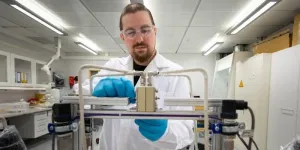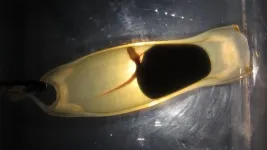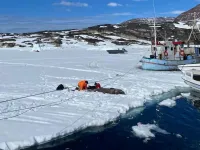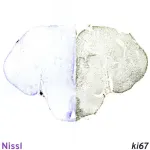Fukuoka, Japan—The phenomenon known as El Niño can cause abnormal and extreme climate around the world due to it dramatically altering the normal flow of the atmosphere. In Japan, historical data has shown that El Niño years tend to lead to warmer winters. This case was exemplified recently with Japan’s warm 2023-2024 winter season. However, there have also been cases of cold winters in Japan during El Niño years, such as the one recorded in 2014-2015. Yet, it was unclear as to why this was occurring.
Publishing in the Journal of Climate, researchers from Kyushu University’s Research Institute for Applied Mechanics have found that the early onset of El Niño around June leads to warm winter climates in East Asia, while the late onset of El Niño is associated with colder winters. The team hopes that their results can help better model winter climate patterns in East Asia during El Niño years, and lead to more accurate long-term climate predictions.
El Niño is a climate pattern characterized by the warming of the tropical eastern Pacific Ocean caused by the weakening of equatorial trade winds that blow from the western coast of South America to the Philippines and Indonesia. In regular years, these trade winds would push the ocean’s warmer waters westward leading to cooler waters rising in the east. These warmer western waters drive atmospheric convection generating clouds and rain.
“Each El Niño is individually unique, and no two El Niños are exactly alike,” explains Post-doctoral Fellow Masahiro Shiozaki who authored the study. “Naturally, these differences lead to a variety of abnormal global climate patterns. To better predict regional weather and climate during El Niño, it is important to know how and where the atmosphere changes.”
Shiozaki highlighted a case in Japan during the winter of 2023-2024. This was an El Niño year, and in Japan that tends to mean a warmer winter. And in fact, the winter of 2023-2024 was inordinately warm. However, this was not always the case. In the El Niño year of 2014-2015, Japan’s winter was colder than average.
“Japanese winters are also influenced by the Arctic as well as strong natural variability inherent to the atmosphere. Because of these various effects, it has been challenging to identify how El Niño determines warm or cold winters in East Asia,” continues Shiozaki. “To address this issue, we simulated the weather patterns of the past 61 years in 100 different ways by adding perturbations to the weather patterns. In this simulation, 1700 El Niño events occurred, and we calculated how the atmosphere changed each time. This method allowed us to reduce any atmospheric noise in the data, giving us a clearer view of El Niño’s direct impact.”
The team’s analysis found that it was not only El Niño, but also an anomalous warming of the tropical Indian Ocean that led to warmer East Asian winters. The early onset of El Niño around June effectively warmed the Indian Ocean from summer to winter. This ocean warming suppressed atmospheric convection over the tropical western Pacific, resulting in less rainfall and atmospheric heating.
“The resulting reduction in atmospheric heating excited atmospheric waves that propagated into the western North Pacific, forming an anomalous anticyclonic circulation southeast of Japan,” Shiozaki explains. “Anomalous south-easterly winds from this circulation pattern weakened the northwesterly winter monsoon from the continent, leading to the warm winter climate in East Asia. On the other hand, cold Japanese winters are associated with a late onset of El Niño and no significant warming of the Indian Ocean.”
The team hopes their new findings will be utilized by researchers and meteorologists to better predict climate patterns months in advance, especially during active El Niño phases.
“The influence of global warming is clear in the recent trend of warmer winters worldwide. The effects of rising water temperatures are especially evident in the Indian Ocean,” concludes Professor Hiroki Tokinaga who led the research team. “Further research is needed to determine how global warming and other tropical climate phenomena will change future winters in East Asia.”
###
For more information about this research, see “What Determines the East Asian Winter Temperature during El Niño?— Role of the Early-Onset El Niño and Tropical Indian Ocean Warming," Masahiro Shiozaki, Hiroki Tokinaga, and Masato Mori Journal of Climate, https://doi.org/10.1175/JCLI-D-23-0627.1
About Kyushu University
Founded in 1911, Kyushu University is one of Japan's leading research-oriented institutes of higher education, consistently ranking as one of the top ten Japanese universities in the Times Higher Education World University Rankings and the QS World Rankings. The university is one of the seven national universities in Japan, located in Fukuoka, on the island of Kyushu—the most southwestern of Japan’s four main islands with a population and land size slightly larger than Belgium. Kyushu U’s multiple campuses—home to around 19,000 students and 8000 faculty and staff—are located around Fukuoka City, a coastal metropolis that is frequently ranked among the world's most livable cities and historically known as Japan's gateway to Asia. Through its VISION 2030, Kyushu U will “drive social change with integrative knowledge.” By fusing the spectrum of knowledge, from the humanities and arts to engineering and medical sciences, Kyushu U will strengthen its research in the key areas of decarbonization, medicine and health, and environment and food, to tackle society’s most pressing issues.
END








